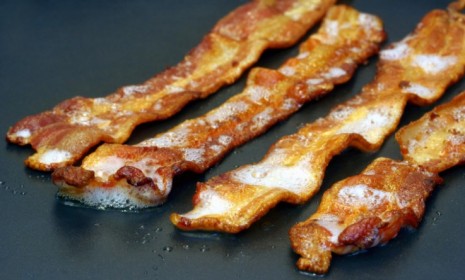Will we run out of bacon... next year?
Livestock producers warn that pork lovers could suffer from withdrawal in 2013, as the effects of a global grain shortage reach the breakfast table

A free daily email with the biggest news stories of the day – and the best features from TheWeek.com
You are now subscribed
Your newsletter sign-up was successful
Addicted to bacon? Savor every bite of that salty, crispy goodness while you can. Industry groups like Britain's National Pig Association say the world is headed for an "unavoidable" shortage of pork and bacon next year, with the number of slaughtered pigs expected to fall by 10 percent and prices set to skyrocket. Is this the end of brunch as we know it? Here, a brief guide to this gut-wrenching news:
Why will we run short of bacon?
It all starts with droughts all over the world, especially in the U.S. and Russia. The dry conditions have scorched corn and soybean crops, reducing feed available for livestock. With the cost of feeding farm animals skyrocketing, U.S. warehouses are actually filling up with pork as farmers scale down their herds. That means pork aplenty for now, with the nation's supply rising to 580 million pounds at the end of August — 31 percent more than the previous year.
The Week
Escape your echo chamber. Get the facts behind the news, plus analysis from multiple perspectives.

Sign up for The Week's Free Newsletters
From our morning news briefing to a weekly Good News Newsletter, get the best of The Week delivered directly to your inbox.
From our morning news briefing to a weekly Good News Newsletter, get the best of The Week delivered directly to your inbox.
How does that translate into a shortage?
Once the stockpile dwindles, farmers won't have enough animals to send to slaughterhouses and replenish the supply. The squeeze is already being felt in Europe, where sow herds are shrinking. Poland has felt the steepest drop, 9.6 percent, and the U.K. is bracing for herds to shrink by as much as 20 percent. British pig producers warn that for every 2 percent drop in supply, the price of pork products will rise by 10 percent.
Is the drought really that bad?
The problem is that dry conditions are so widespread. In August, nearly half of all counties in the U.S. had become so hot and parched that they were considered disaster areas. Farmers have taken to extreme measures to keep their animals fed without going broke — one, in Kentucky, even resorted to feeding his cattle candy "just to survive."
A free daily email with the biggest news stories of the day – and the best features from TheWeek.com
Can anything be done to save our bacon?
Maybe, but it will mean political war. In the U.S., the livestock and poultry industries are urging the federal government to suspend the mandate on ethanol use in fuel so that more affordable grain will be available for feed. The U.S. Renewable Fuel Standard requires the blending of billions of gallons of corn-based ethanol into gasoline, but livestock producers are requesting that the program be waived "in whole or in substantial part" for the next year, until the Great Bacon Crisis of 2013 passes. In the meantime, remain calm, says Adriana Velez at The Stir. No one has "ever died from not eating enough pork chops." And brunch will go on — we'll just have to find some "other meaty, crunchy treat would you eat at brunch" until the bacon returns.
Sources: Financial Times, Huffington Post, Los Angeles Times, The Stir


